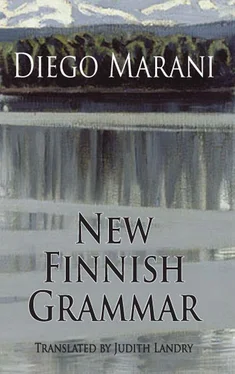‘I expect we’ll find the Russians waiting for us at the Kämp,’ joked someone as we piled back into the car.
With May came light. They put little tables out at Kappeli’s, and in the morning fishing boats would tie up at the wharves in front of the market, selling salt fish and onions. The ferry to the islands came back into action, a little old wooden steamer smelling of diesel and wet rope. It would make a languid departure at mid-day, taking a broad turn in the bay before disappearing behind the island where the yacht club was. The days were pulling out, and all that light would send me wandering the streets till late, almost always on foot, stopping to rest on the benches when I was well and truly exhausted. Sometimes I would board the first tram that came along and go on to discover new parts of the city. By now I’d been through every suburb of Helsinki, from Laakso to Valilla. Koskela had given me a map which he’d torn out of the telephone directory, putting pencil rings around the places I should visit. A conscientious tourist, I had been to every single one, always bringing back some memento, a theatre programme, a ticket I’d found on the ground, an empty packet of some unknown brand of cigarette. I took notes, followed my routes on the map, copied out words I had not understood, and had the pastor explain them to me during the next lesson. Day after day, I had gradually taken possession of Helsinki’s streets. I began to sample the reassuring feeling of already knowing what awaited me round the next corner. Like an animal on its own home ground, I had dug my own personal itineraries out of the tangle of streets, the routes I took to go from one place to another without bothering to try and find the shortest one. But I knew the city as a tourist, not as a native.
The moment anyone asked me anything, no matter how banal, my reassuring sense of anonymity deserted me. My words betrayed my outsider status: my very voice gave off sounds that did not ring true, like a cracked glass. The language did not flow with ease; I had to construct each word carefully before pronouncing it, laboriously seeking the right amount of breath, the correct pressure of the lips, sounding out my palate with my tongue in search of the only point which could produce the sound I was looking for and then turning it into the right case before actually delivering it up. That cavity which was my mouth, which seemed so small, would suddenly become immense. It seemed impossible to me that everything should be played out within those fractions of a millimetre, that a segment of muscle, if too tense, should alter a meaning completely, that one puff of air too much, or too little, should be enough to cause me to be mistaken for an Estonian or Ingrian, or indeed break off the thread of meaning entirely.
Often on the tram I would pick up bits of phrases, snatches of conversation which I would brood over mentally until I learned them. Then, when I was alone, stretched out on my bed before falling asleep, I would repeat them aloud, building up the missing parts around them and projecting invented worlds on to the grey walls of the visitors’ quarters, in which I would engage in conversation with imaginary friends to whom I gave the faces of the people who had been around me in the tram. When Koskela left, and I was absolutely alone, I could no longer distinguish real people from those I had imagined. One day, at the no.7 tram stop, I said a friendly hello to an elderly gentleman with a moustache who had showed me the way to the Olympic Stadium not long before. Only later did I realize that I had imagined the whole thing or, to be more accurate, that I had muddled things up: the gentleman with the moustache had given the relevant information not to me, but to a young man sitting next to me on the tram; and it wasn’t the Olympic Stadium he’d wanted, but the university hospital. The Olympic Stadium was what I could see out of the tram window at that moment. I remembered every one of the words they had exchanged, the expressions and even the gestures that had gone with them. Like so many others, I had repeated them a thousand times: I had made them my own.
In my wanderings, I would mingle with the silent crowds leaving church on a Sunday, or with the queues outside the grocers’ shops. I also liked to join the throng of people boarding a tram: I would pretend that I too was getting off at a certain stop, that I too was going somewhere specific, and from time to time I would look out of the window to see how far it was to my imagined destination. Then I would get off at some randomly chosen street, walk purposefully for ten or twenty paces, to give the tram time to move off, then resume my aimless ramblings. I would go on to the next stop and wait for the tram on the other side of the street, taking it back where I had come from. To all intents and purposes I was a Finn like all those around me, except that no one knew me; six months ago, no one would have seen me. They greeted one another, recognized each other when they met. I was not included in any handshake. If all the inhabitants of Helsinki had come together one day to talk about that lonely individual with the strange accent who walked from one end of the city to the other at the strangest hours, getting on and off trams at random, they would have found that not one of them knew me, that not one of them knew where I was from.
But if human beings were unacquainted with me, inanimate things on the other hand — gardens, trams and buildings — knew me well. I often caught myself addressing the curious-looking houses in Eira, with their rounded roofs and floral balustrades. With them, I didn’t need to worry about my pronunciation — I could greet them in Finnish like old friends. I would tell them where I was going, what I had been doing; they bore their names carved or painted on their façades, and I would speak them out loud. I felt particularly happy talking to the trees on the Esplanadi — after all, they were the ones that knew me best. But I talked to them under my breath, so that no one would hear me engaging so closely, and oddly, with another species. Beneath their branches, I felt safe; I found it reassuring to see that they were now so luxuriant, to know that they were well and truly alive in all their silent greenery. I felt their roots spreading beneath my feet, retaking possession of the earth which had been frozen for so many months, and this too gave me heart. Then the white nights came: punishing sunsets would slowly trickle into dawns as dense as drops of mercury. With that never-darkening sky outside, it was impossible to stay indoors. The night light flooded the city with its white silence, suffusing every room, however shut away, reaching down into the deepest cellars, unearthing people wherever they lay hidden and driving them outside. Wandering through the streets, crossing the bay from side to side, as far as the encircling forests, they set out in pursuit of the mirage of eternity which those undying days seemed falsely to promise. Goaded on by this same ungovernable lunacy, I too would go out to contemplate the disquieting yet majestic sight of darkness becoming light. I liked above all to walk along the beach, beyond the bay of Taivallahti. The sea itself seemed to be in thrall to that same magic. Perhaps this was the world of the heroes of the Kalevala ; perhaps it had never come to an end, was still living on beside our own, visible only to shamans like the Pastor Koskela. Caught up in such fantasies, I imagined ships laden with warriors emerging from the sea, glittering and bristling with lances. I saw the tree trunks scattered on the beach as so many gruesome idols, the lightning flashing out at sea as the limitless wrath of the god Ukko. Those night-time hours, stolen from sleep, truly belonged to another era, another world, and you needed to be very drunk to embrace the sense of infinity they bore so numinously in their wake.
Читать дальше












